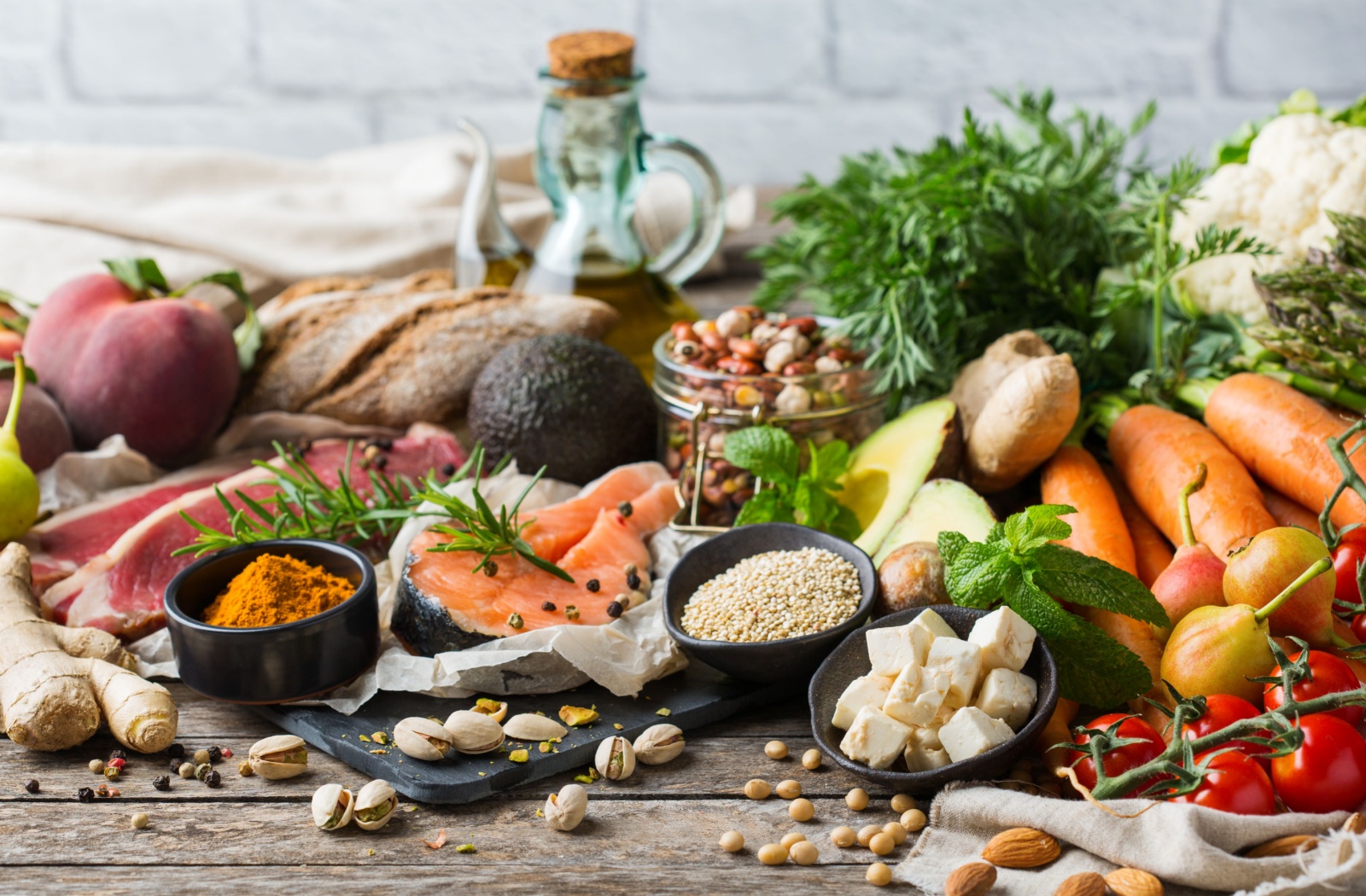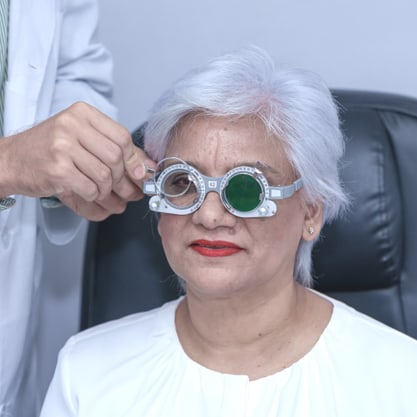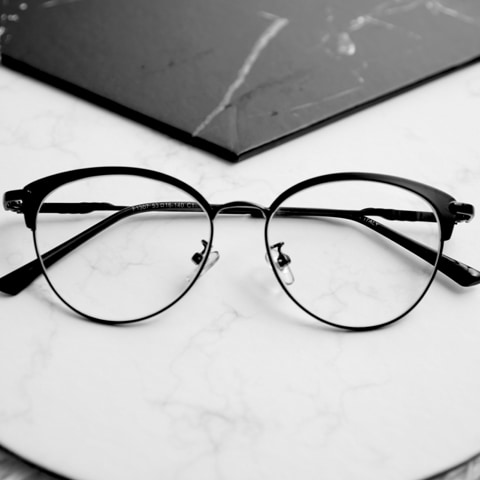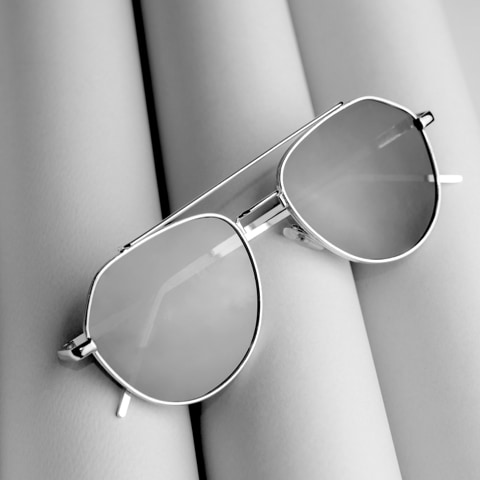Just like your heart, brain, and other organs, your eyes depend on nutrients for healthy and optimal functioning. Your diet can directly influence how your eyes function and age, and can even protect against health concerns.
Some delicious foods that support healthy eyes include:
- Dark leafy greens (broccoli, spinach, kale, etc.)
- Eggs
- Nuts and seeds
- Fruits (citrus, blueberries, cantaloupe)
- Wild salmon
Although it’s fine to enjoy unhealthy foods from time to time, it’s wise to show restraint. Try to avoid regularly eating:
- Saturated fats
- Snacks with added sugar
- High sodium foods
- Processed foods
Adopting sustainable and nourishing habits supports better vision and overall well-being!
Foods That Nourish Your Eyes
Nutrient-rich foods provide the vitamins and minerals your eyes need to stay healthy, support strong vision, and protect against eye conditions like cataracts and age-related macular degeneration (AMD).
You can easily integrate these foods into your meals, proving that caring for your eyes doesn’t have to be complex!
Leafy Greens
Dark leafy greens like spinach, kale, and Swiss chard are nutrient powerhouses for your eyes.
These vegetables contain two powerful antioxidants, lutein and zeaxanthin, that help protect the eyes from oxidative stress. Because the retina contains high concentrations of these nutrients, eating dark leafy greens helps reduce the risk of developing age-related eye conditions such as macular degeneration and cataracts.
Broccoli is also an excellent source of lutein, zeaxanthin, and vitamin C, which can further protect against eye-related diseases.
Here’s how you can incorporate more leafy greens into your diet:
- Add a handful of spinach to your morning smoothie for an easy vitamin boost.
- Toss kale into soups, salads, or scrambled eggs.
- Use spinach as a base for your salads or blend it into pesto for a versatile and delicious sauce.
- Steam broccoli lightly and serve it as a side dish or add it to stir-fries for a crunchy and nutrient-packed addition.
Of these dark leafy greens, broccoli and spinach contain the highest amount of lutein.
Eggs
Eggs are another great source of lutein and zeaxanthin, protecting your eyes from age-related vision loss. The yolks also contain zinc, which supports retinal health.
Adding eggs to your meal rotation is very simple! Nothing compares to a solid egg-based breakfast:
- Cook a sunny-side-up egg for breakfast or whip up a quick omelette filled with veggies for a nutrient-packed meal.
- Use hard-boiled eggs as an easy snack or salad topper.
Nuts & Seeds
Almonds, walnuts, chia seeds, and flaxseeds are excellent sources of vitamin E and omega-3 fatty acids. These nutrients help protect your eyes from oxidative stress, which can lead to diseases like age-related macular degeneration (AMD).
Here’s how you can sneak more nuts and seeds into your meals:
- Add a handful of almonds or walnuts to your cereal, oatmeal, or yogurt.
- Sprinkle chia or flaxseed into smoothies or bake them into energy bars.
A Medley of Fruits
Not only do they taste delicious, but oranges, grapefruits, lemons, and limes are bursting with vitamin C. This is an antioxidant that helps maintain healthy blood vessels, including those in your eyes, while also protecting against cataracts and AMD.
Here’s how to add more citrus fruits to your meals:
- Enjoy a glass of freshly squeezed orange juice in the morning.
- Snack on clementines or add grapefruit segments to salads.
Blueberries contain many antioxidants, especially vitamin C and anthocyanins, which protect your eyes from oxidative stress. A study suggests that regularly consuming blueberries can reduce the risk of age-related macular degeneration.
- Add a handful of blueberries to your morning yogurt, oatmeal, or smoothie.
- Use blueberries as a naturally sweet topping for pancakes or waffles, or enjoy them as a convenient snack.
Cantaloupe is a delicious fruit that’s rich in beta-carotene, a precursor to vitamin A, which is essential for good vision. Vitamin A supports corneal health, helping to prevent dry eyes. This juicy melon is also abundant in vitamin C.
- Slice up fresh cantaloupe as a refreshing snack or add it to fruit salads for a burst of natural sweetness.
- Blend cantaloupe into a smoothie with other fruits like pineapple and banana for a hydrating, nutritious drink.
- Pair cantaloupe with prosciutto or cheese for a simple, gourmet appetizer.

Wild Salmon
Omega-3 fatty acids, which support retinal health and may prevent dry eye syndrome, are abundant in fatty fish like wild salmon. Plus, omega-3s help reduce inflammation in your body, including in your eyes.
Here’s how you can make salmon the star of your meal:
- Grill or bake salmon for dinner.
- Toss canned salmon into a salad for a quick and easy lunch.
Incorporating certain supplements, like Omega-3 oils, can be a great addition to an already healthy and nourishing diet. However, not all Omega-3 oils are alike.
At Sage Eyecare, we recommend specialized dry eye Omega-3 oils that are re-esterified triglyceride format (for better absorption by our bodies) and have clinical research papers to back this up.
Snacks That Harm Your Sight: Foods to Avoid
Avoiding unhealthy food options in large quantities is ideal, so balance and moderation are key. Focusing on a diet rich in eye-healthy foods can help counterbalance these occasional indulgences.
Saturated Fats
Trans fats and saturated fats, often found in fried foods and processed snacks, can raise your LDL (bad cholesterol) levels, which may restrict blood flow to your blood vessels. Poor blood circulation can increase the risk of AMD.
Try to limit eating packaged chips and snacks, fast food, and deep-fried dishes.
Snacks with Added Sugar
Excessive sugar consumption can spike your blood sugar, harming the delicate blood vessels in your eyes over time.
Studies have linked high-sugar diets to an increased risk of diabetic retinopathy, a condition that can cause vision loss.
While occasionally enjoying a sweet treat is okay, avoid unnecessary sugar like sugary cereals, candy, chocolate, and desserts like cake and cookies whenever you can.
High-Sodium Foods
A diet high in sodium can increase blood pressure, negatively affecting blood vessels in the retina. Besides, high blood pressure is a risk factor for glaucoma, a serious eye condition that develops suddenly, leading to vision loss without timely management.
Eating highly salty foods, like pretzels, chips, processed meats (bacon, sausage, deli items), and canned soup with high sodium content, can also aggravate the risk of fluid retention, leading to puffiness and swelling near your eyes.
Processed Foods
Despite their convenience, highly processed foods are often low in nutrients and high in unhealthy fats, sugars, and artificial additives. Besides affecting your eyes, they can harm your overall health by increasing inflammation in your body.
It’s not just fast food. Avoid regularly eating microwave meals, packaged sweets, and instant noodles.
Support Your Vision: Make Smarter Choices
Eating a colourful diet rich in nourishing whole foods is a lifelong habit that can support your eyes and overall health. You don’t have to say goodbye to the unhealthy foods you love, a balanced approach helps keep you steady.
Supporting your eye health feels easier with the right nourishing supplements. With many readily available options, our Sage Eyecare experts can walk you through top-of-the-line choices.
While you continue making healthier choices on your plate, our Sage Eyecare team can contribute by monitoring your vision and eye health through routine eye exams. Connect with our team today to schedule your next eye exam!

























